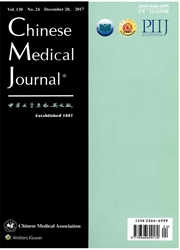

 中文摘要:
中文摘要:
目的对补充维生素E预防心肌梗死的效果进行Meta分析。方法在Web of science、Pub Med、Embase数据库检索所有相关的临床随机对照试验研究文献,同时追索文献的参考文献,检索起止时间为建库时间至2015年5月。2名研究者严格按照纳入标准和排除标准对检索到的文献进行筛选,并进行文献质量评价,提取有效数据,应用Meta分析方法对符合标准的各个研究进行分析及数据合并。采用Review Manager 5.0软件进行数据分析。结果共纳入文献5篇,包括87 296例人群(其中试验组43 647例,对照组43 649例),由方法学质量评价得出,各研究间基线相似,Jadad评分显示均为高质量研究。Meta分析结果显示,各研究间具有异质性(P=0.02,Ι2=65%),采用随机效应模型进行效应量合并,补充维生素E与安慰剂比较,心肌梗死发病率差异无统计学意义[RR=0.94,95%CI(0.82,1.08),P=0.39]。敏感性分析结果显示,合并效应量分别为RR=1.01,95%CI(0.94,1.08),P=0.74;RR=0.97,95%CI(0.86,1.09),P=0.58;RR=0.91,95%CI(0.76,1.09),P=0.31;RR=0.88,95%CI(0.73,1.07),P=0.19;RR=0.90,95%CI(0.72,1.12),P=0.34,剔除任意一项研究后对Meta分析结果没有逆转作用。漏斗图分析结果显示,研究的发表偏倚较小,结果可信。结论 Meta分析结果提示,尚无证据认为补充维生素E能预防心肌梗死发生。
 英文摘要:
英文摘要:
Objective To explore the effect of vitamin E on the protection on myocardial infarction by conducting meta-analysis. Methods Data base of Web of science,Pub Med and Embase were searched for all related articles about the protection of vitamin E on myocardial infarction. The search work stopped on May of 2015. According to the including and excluding criteria,two investigators choose the matched trials. Combined with quality evaluation,acquired the available information. Utilized Meta-analysis to assess selected studies and affiliated data. We utilized Review Manager 5. 0 to statistic all data. Results Five studies were randomized controlled trials articles. 87 296 individuals were( 43 647 individuals were in test group and 43 649 individuals were in control group) analyzed and base line of two groups were comparable.The results of system assessment suggested that there was no significant difference on the protective effect of vitamin E on myocardial infarction[RR = 0. 94,95% CI( 0. 82,1. 08),P = 0. 39]. Sensitivity analysis indicated that the result did not reverse when deleting a study[RR = 1. 01,95% CI( 0. 94,1. 08),P = 0. 74],[RR = 0. 97,95% CI( 0. 86,1. 09),P =0. 58],[RR = 0. 91,95% CI( 0. 76,1. 09),P = 0. 31],[RR = 0. 88,95% CI( 0. 73,1. 07),P = 0. 19],[RR = 0. 90,95% CI( 0. 72,1. 12),P = 0. 34]. The infundibulum figure showed publication bias was small and the result was credible.Conclusion There is no direct evidence for the preventive role of vitamin E on myocardial infarction.
 同期刊论文项目
同期刊论文项目
 同项目期刊论文
同项目期刊论文
 Restrictive bare stent for prevention of stent graft-induced distal redissection after thoracic endo
Restrictive bare stent for prevention of stent graft-induced distal redissection after thoracic endo Treatment of Type I Endoleak after Endovascular Repair of Infrarenal Abdominal Aortic Aneurysm: Succ
Treatment of Type I Endoleak after Endovascular Repair of Infrarenal Abdominal Aortic Aneurysm: Succ Double-chimney Technology for Treating Secondary Type I Endoleak after Endovascular Repair for Compl
Double-chimney Technology for Treating Secondary Type I Endoleak after Endovascular Repair for Compl Endovascular repair of the half aortic arch in pigs with an improved, single-branched stent graft sy
Endovascular repair of the half aortic arch in pigs with an improved, single-branched stent graft sy Repeat Endovascular Exclusion for Distal Tear after Treatment of Primary Aortic Dissection by Endova
Repeat Endovascular Exclusion for Distal Tear after Treatment of Primary Aortic Dissection by Endova 期刊信息
期刊信息
